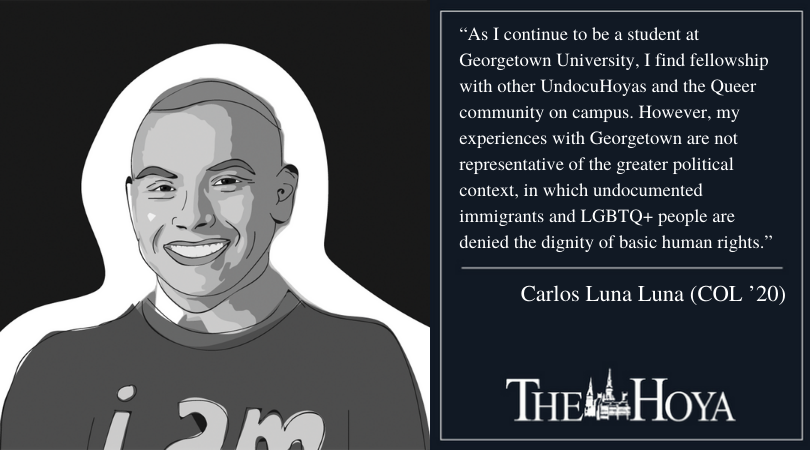I carry with me various identities. UndocuQueer, the intersection of being both Undocumented and Queer, is one of them. At various points in my life, they were both shameful identities that I could not speak of and had to keep hidden in the shadows: The day after the election of President Donald Trump, I wanted to hide because I feared for myself and my family due to my undocumented status. Throughout my life, growing up in toxic hypermasculine spaces, I learned to take refuge in womxn-dominated spaces and not disclose my queerness for fear of the repercussions.
I have recently come to reflect on my UndocuQueerness due to recent political events. Earlier in October, the U.S. Supreme Court heard cases on whether employers can legally fire LGBTQ+ people based on their sexuality or transgender identity. This November, the same court will hear a case deciding the future of Deferred Action for Childhood Arrivals. Being a DACA recipient since January 2015, I have been able to continue pursuing a college education. To live under Trump’s administration is to constantly question my humanity because of my queerness and my immigration status.
Because the personal is political, I want to share my story. Less than two months ago, I came out to my parents. Each of their reactions was different. “Una madre, siempre va amar a sus hijos” — a mother will always love her children unconditionally — my mother responded as she hugged me in the middle of Chicago Union Station. I heard my father’s reaction over the phone since I could not face telling him in person. After I said the words “Soy Gay” — I’m Gay — there was a long period of silence followed by the click of an ended phone call.
The burden of what my parents would say or think is no longer something I have to carry. I demonstrated a lot of bravery to follow my desire to taste the freedom of being my authentic self entirely. I finally felt ready to come back to Washington, D.C., and finish my last year at Georgetown University, leaving behind the crushing weight of my family’s traumas and machismo upbringing.
I now constantly reflect on what it means to live openly as Queer and Undocumented. Jennecit Eva Gutiérrez, a transgender undocumented woman said, “Mi existir es resistir” — My existence is resistance. As such, I owe it to myself and others to be my authentic self and carry my identity with pride.
I stand on the shoulders of a community that has helped me to be where I am now. My mother, a crew worker at McDonald’s, and my father, a pallet repairman, would have never envisioned what I have now accomplished — soon to be the first in my family to graduate with a bachelor’s degree, from an elite university at that. It was no easy feat to get here, and I have struggled numerous times. At one point, dealing with self-acceptance, being diagnosed with depression, family relations, and dealing with an institution that is inherently not for people like me — these struggles pushed me to leave Georgetown to pursue a medical leave of absence.
While growing up in the southwest side of Chicago, being Undocumented was the most salient identity I carried with me every day. My immigration status had closed many doors for me to pursue higher education. I have worked hard ever since I was a young boy because of my family’s low-income status: I would help my parents collect scrap metal from the dumpsters and alleys of Chicago so we could later resell it as a form of work. There were times when, because of our inability to pay for gas, we had to heat our water and cook with propane gas tanks, especially during the harsh months of winter. But I always knew that if I were able to attend a school with a need-based aid policy, I would have the golden ticket to change my family’s trajectory — out of poverty. Transferring to Georgetown from Loyola University’s two-year Arrupe College was my golden ticket.
My background and experiences have shaped me into who I am today. Growing up, a lot of conversations about me circulated around college admittance, but now the question I find myself asking as a first-generation college student is how to navigate college and life after graduation. My options for life after graduation have caused me more stress as the future of DACA is jeopardized because of the upcoming court case.
As I continue to be a student at Georgetown, I find fellowship with other UndocuHoyas and the Queer community on campus; these communities have offered me the space to develop myself. University departments like the Georgetown Scholars Program and the Center for Multicultural Equity and Access have provided me with resources to excel. However, my experiences with Georgetown are not representative of the greater political context, in which undocumented immigrants and LGBTQ+ people are denied the dignity of basic human rights. Today, I urge my fellow Hoyas to take part of Hoyas For Immigrant Rights’ walkout, during which students will march from Healy Circle to Dupont Circle and finally to the Supreme Court on Friday, Nov. 8, as part of a series of campuses walkouts throughout the D.C.-Maryland-Virginia area. We must stand with one another in solidarity, especially during a time when our humanity is constantly questioned.
Carlos Luna is a senior in the College.










Mónica • Oct 27, 2019 at 9:48 pm
I just want you to know one thing, you are doing a great job!
Byron Adams • Oct 27, 2019 at 3:11 pm
Wow Luna! I’m a friend of mine Bento. He has always spoken highly of you. Now I know why. I hope to meet you sometime soon and congratulate you for that you have, and will, accomplish.